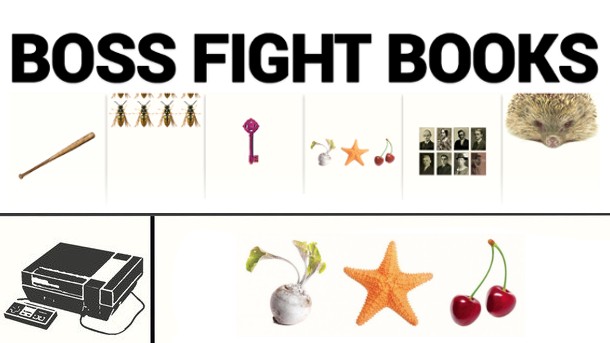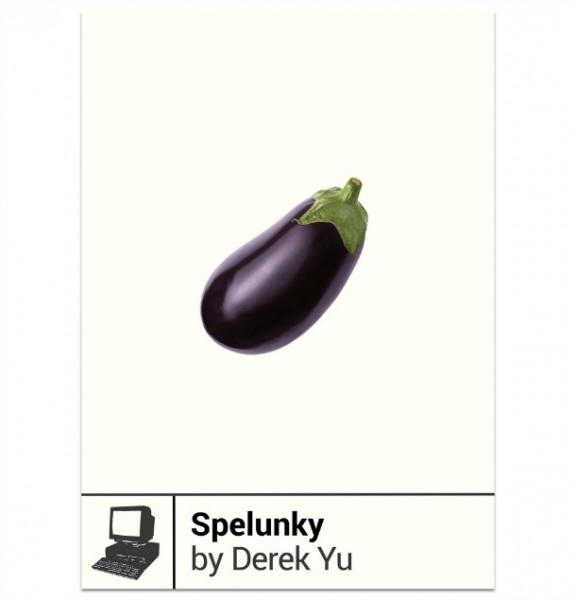Please support Game Informer. Print magazine subscriptions are less than $2 per issue
Rethinking Video Game Novels With Boss Fight Books

Boss Fight Books is a small press with a large sense of scale. Series Editor Gabe Durham Kickstarted a line of books that encapsulates classic video games. Each book is filled with an individual author’s thoughts on a game, relationship to it now, and experiences surrounding their time with it.
The small press has published 11 full-length books including Earthbound, Chrono Trigger, Shadow of the Colossus, and more. Each game is covered by a separate author, ranging from writers completely outside of gaming to people deep in the trenches of the industry. This includes Derek Yu, who recently released his autobiographical reflection on his indie hit, Spelunky. We talked with Durham to find out how Boss Fight Books touches on the personal side of gaming, stays on people’s radar, and what the future of the small press looks like.
Boss Fight Books sits
in a unique position, as a small press, for homing in on the more personal
stories attached to games. I feel like some video game books come off as too
clinical. What kind of personal stories can readers expect to come across in
the series?
I think you're right that the personal side can often be
highlighted because that's not always what we see in games culture. So, my take
is that there are so many ways to approach games, and that we can benefit from
all of them.
We try to approach all of our games subjectively; I'm a little less concerned with trying to create the definitive book on a particular game, but instead offer this author's take on this particular game. So what each game calls for, and what each author brings to it, is often going to be unique to their experience. To me, when you free yourself to write as a real person, as a flesh-and-blood human being, who has your own unique history with a game, then a lot of cool stuff can happen.
I think that's some of the magic of writing. When you start offering specifics on the ways that you have encountered games, then that's naturally going to resonate with certain other readers. You never know what those are going to be, and since we're all inside of our own heads we don't know how we're going to relate to other people, but it always happens.
What you're saying
kind of reminds me of the way people relate to albums, and how a slice of their
life comes through in the game. They kind of bleed together no matter what.
When you think back on an album or a game, you think back on what was happening
in your life, good or bad.
Yeah! There's that time-capsule element of remembering where
you were when you first heard that song, or saw that movie, or played that
game. The fact that games are experiential only makes that stronger, because
that game isn't just the game by itself but it comes alive with you playing it.
It's the art form that doesn't fully exist until you engage with it.
On the subject of
music, you've noted in previous interviews that Boss Fight Books is similar to 33 ⅓, which is a book series about
delving into individual albums the same way your books deal with a single game.
How does Boss Fight Books set itself apart from 33 ⅓?
When I had the idea for the press, I was peripherally aware
of 33 ⅓ for a long time, then I just read a bunch of
them. I really admired how the books were different from one another. They
really seemed to offer authors a lot of freedom to explore different things and
didn't strictly stick to a template. But I did find that there were some things
I wasn't responding to as much. For instance, one of their earliest books was
on Radiohead's OK Computer, which is
a really beautiful and exciting album, and I found the book really lifeless.
It's really clinical. It read a little bit as if someone had written a PHD
thesis, and then had hastily tried to turn that into a book.
I come to Boss Fight as a writer. I studied writing in college and got an MFA in fiction writing, and spent a lot of time thinking about what excites me in books, and I knew that I also wanted to put out books that are different from one another, but I also wanted to put out books that are really smart and informed and researched, but not academic in tone. That became really important to me, because I think there's a real distancing that can happen once you start using a certain kind of language. Particularly really jargony language that is meant to be understood only by a privileged few. That is a real bummer to encounter.
Books in the series
are often written by people with ties to the video game industry. For example,
Ashley and Anthony Burch of Hey Ash, Whatcha Playin’? fame wrote about Metal
Gear Solid. Could you describe the selection process for your authors?
That was another way that I'd hoped to achieve variety in
the series. I knew from the outset that I hoped to work with video game
industry insiders and enjoy the way that they think about games the only way
that somebody works in games can, and then just the opposite too: work with
people who are just writers, like Matt Bell and Michael Kimball. Who really, in
both cases, have never written about games before.
I think there are benefits that really come from both sides. As far as our selection process, it's come to us from so many different ways. During that first season, I was approaching people because we didn't exist yet. [Boss Fight Books cover designer and Earthbound book writer] Ken Baumann was one of the very first people that I talked to about my idea for the press, and he kind of dared me into it, and I dared him into writing a book. It was a really fun early conversation.
Since then, it's been a combination of me either reaching out to people, or people reaching out to me. We do an annual reading season for about a month long, and I believe this year we're going to do it in June. We just accept open pitches from anybody who has an idea for a book, and ask them to explain what they would do for the book, why they think they're the person to write it, and sometimes to present a little sample excerpt of what they would do with it. So we've done that for 2 years now in both seasons, and that has gone really well and we've found some good people out of nowhere.
Next up: Find out how Boss Fight Books stays visible, what the small press has in store for its future, and how Derek Yu tackled writing a book about his own game.

Derek Yu’s recently
released Spelunky book is the first in the series to be written by the game’s
creator. How is the tone of Yu’s book different from Boss Fight Books’ catalog?
Somebody observed in a review recently that a lot of the
fuel of the books comes from that writerly distance between themselves and
their subject. For Derek there's none of that. He is Spelunky. The benefits are
different, and the opportunities are you can get it straight from the horse’s
mouth and find out everything he actually thought.
When you're an artist you're just pursuing what feels right, and you're making the decisions that feel good on the spot, and you're rejecting the things that aren't working. You kind of get the benefit of times of not having to articulate all the choices you make, because you're justifying to yourself. So, some of this is in retrospect of investigating some of his choices for the first time. So you do still get some of that distance between Derek, the guy who's in the middle of making a game he doesn't understand, and the Derek who is the creator of a really wonderful indie game. I think the similarity you've already kind of touched on is that he's naturally a really reflective guy.
What are some of the
benefits of having authors propose the book they’re going to write?
Writing a pitch is a really challenging thing because it’s a
book that doesn't exist yet. I think if you're being honest, you have to allow
the space for the project to change as you're writing it. To me, a lot of the
joy of writing is in the discovery of things that happen along the way. You
don't completely know the destination as you're working on it – that was
certainly true for me working on the Bible Adventures book. It's probably true
for most of our authors. You have a sense of what's exciting to you, and you can
communicate that and can say, "I see so much that I want to explore here,
there's so much material. Look at the history of this game. Look at the unique
ways that I've encountered it. Look at these aspects and how they intersect
with the world, myself, video game culture, and the arts.
Small presses often
have an uphill battle for retaining visibility. What has been your strategy for
keeping Boss Fight Books visible?
I think a couple things have helped us a lot. One is the
fact that we're the first press doing this exact kind of project. I think what
we found really early on and what remains true is that there is a hunger for
this kind of book. I'm 32 and a lot of us are coming back to games that we
played as kids, or playing games now for the first time, and we're really
interested in trying to process that with our adult brains, and really kind of
thinking about it in a deeper way.
So there's naturally an audience who's interested in that, but I think that a lot of what helps us stay on people's radars is the fact that it’s a series, and one of the things that I like to see is that whenever a book comes out, we usually find new readers who hadn't heard of us, and when they get excited about the new book they also start digging into the back catalog. So there's this kind of nice way that each new book really reinvigorates our back catalog in a way that I don't think happens to the same extent with other presses.
What does the future
of Boss Fight Books look like?
I'm happy to mention that we're planning the launch of a new
Kickstarter. I'm just going to leave it in suspense for what the actual titles
are. First of all, I think there's so much more to explore on this topic, I
don't feel at all like we've exhausted what can be explored in these books
about games. A lot of that comes from people continuing to show up with new
ideas, new takes, and new things to say about games that make me really excited
to read a book that doesn't exist yet.










